
Inspiring our people

The wellbeing, safety and development of our people has always been at the heart of everything we do. This has been more important than ever over the past year.
We constantly seek to grow and engage our people, and acknowledge the difference they make by:
- Creating a supportive, positive, flexible work environment.
- Agreeing expectations upfront and managing performance continuously to ensure that everyone knows what’s required to meet our goals.
- Developing and coaching our people by providing learning and exposure opportunities tailored to their individual requirements that will equip them for the new world of work.
- Ensuring we have the right people and skills to perform the work we do, at the quality required.
- Supporting their well-being to be their whole self.

Creating a supportive, positive, flexible work environment
We’ve had a culture of flexibility for a number of years now, but recent investments in technology allowed all 5,400 of us to shift to home working overnight when the COVID-19 lockdown was announced. But more than just enabling us to work, it played a crucial role in connecting us with our teams and allowing us to support each other.
We have a work environment where we want everyone to feel included, supported and safe. Due to the pandemic, we took a decision, globally, to postpone our annual global people survey for FY20.
We didn’t want to burden our people with an additional request at a time when they were adapting to full remote working and juggling personal and professional responsibilities. We plan to carry out the global survey again in FY21. Instead, we asked our people for their feedback through short pulse surveys since the lockdown started at the end of March 2020. The pulse surveys gave us valuable information about our people working from home, how they are feeling, what they most needed and their perception about our response to the pandemic.
At the end of the financial year;
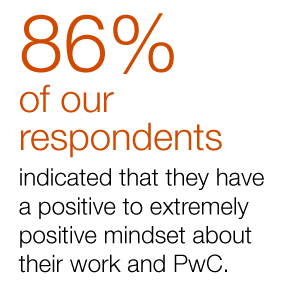
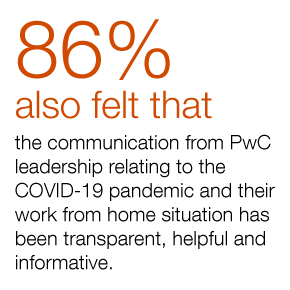
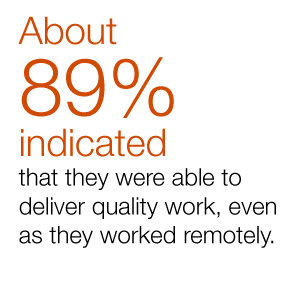
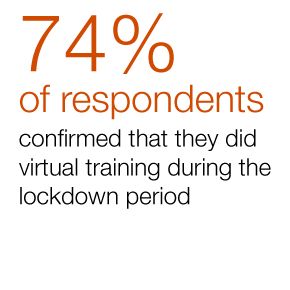
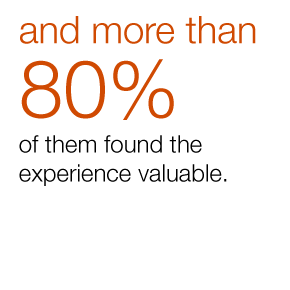
We continue to invest in programmes to help our people to work flexibly and manage their energy and personal wellbeing so they can be their best selves at home and at work.
Agreeing expectations and managing performance
At PwC every employee has a team leader and a coach to support them in the delivery of their work, their development needs and wellbeing. All people are expected to set annual goals agreed with their team leader and coach and to obtain continuous feedback on their performance and development areas.
We’ve invested significantly in technology to digitally enable our people to receive real-time feedback that’s focused on improving their skills and performance. Digital tools used for this include Snapshot and Workday.

Snapshot is used to capture feedback on work, and assesses progression against the five dimensions of the PwC Professional Framework, identifying development actions where appropriate and highlighting examples of differentiated performance. Our people are expected to obtain continuous feedback throughout the year. During FY20, 32 303 Snapshots were completed by our people.

Workday, our cloud-based global people management system, is used to capture and track progress on our performance goals.

Feedback forms a key element of our annual appraisal process. Partners and staff assess their performance against their agreed goals and against grade-related skills and capabilities based on the PwC Professional. The appraisal process covers technical competence and quality, and consideration is given not only to what an individual has achieved, but also how it was achieved. We continue to focus on the contribution and impact our people make on each other, our clients and our society.
Our top performers have the opportunity to progress faster and to receive higher reward and recognition through pay and bonuses. Our people who perform below average are supported to improve and will progress more slowly, and where performance is unsatisfactory, corrective action is taken. Early in the lockdown we took the decision that we want to preserve jobs at all cost and implemented a number of actions to do so. These included cutting all discretionary expenses, not renewing contracts for certain contingent workers and deferring some promotions and increases that were due on 1 July 2020.
Developing and coaching our people
We develop our people through a combination of on-the-job experience, coaching and formal learning programmes. Each person in PwC has a team leader and a coach.
We have more than 1 400 coaches and 600 team leaders in PwC South Africa.
Team leaders are responsible to care for and manage between 10 - 15 people. Coaches are responsible for assisting their coachees with career planning, development and the opportunity to learn from others using discussion and exchange.
As part of our transformation strategy we have launched a talent activation programme designed for high performing ACI talent where participants team up with senior partners to provide additional exposure to business opportunities, mentoring, advocacy and teaming. 125 senior managers and associate directors are currently enrolled.
We are focused on supporting our people on their personal learning journey and have created a range of opportunities for them to develop the technical, digital, business and leadership skills they will need, to be able to work at their best in the new world of work.
Our people have access to a number of formal training opportunities which are delivered in different formats including modularised face to face, virtual classroom, elearn and blended learning. Being part of a global network we use a global learning management system, Vantage, which houses all our formal and informal learning. Vantage consists of thousands of curated self-paced learning assets from some of the globe’s top learning institutions including TED and Harvard Business Review, and has collaborative learning functionality which allows our people and their teams to create and share learning that is relevant to them. Our access to high quality global programmes, which we tailor for our specific market, allows our workforce to develop skills that support mobility across Africa as well as the rest of the world.
During the year our firm invested R79.1 million in skills development for all staff. Employees each received an average of 60 training hours per annum. We also invested R17.8 million towards formal education of our workforce in the form of bursaries.

Given COVID19, virtual learning has become the norm, and we responded quickly in using our technologies to convert our face to face training to virtual so that our people could seamlessly continue their learning journeys. Google Classroom, Jamboards, Meet and WebEx training centre were some of the technologies we leveraged. Our people attended 80 353 hours of virtual training (virtual classroom and online training) between the start of lock down and the end of June 2020 with an average of 15 hours per person.
The new world of work will demand the development of new skills. Like many of our clients, we're going through a digital and workforce transformation ourselves to adapt and get ready for the future. By 2022 the skills we need to perform most jobs will have shifted significantly and while the core skills to perform a job may remain the same, proficiency in new technologies and business skills will increase in demand relative to their prominence today. We’ve focused on offering programmes which equip our people with skills for the future.
We have delivered 7 refreshed learning journeys focused on future skills such as creativity and emotional intelligence. We have also continued our digital upskilling journey, offering all our people intermediate level training in data analytics, visualisation, and robotic process automation, as well regular digital events and meetups supplemented by curated learning assets on PwC’s Digital Fitness App and on our Digital Hub. In FY20 5,300 staff members in South Africa completed some form of digital upskilling. Our staff completed an average of 7 hours of digital training each for the year.
We are particularly proud of our learnership and graduate programs that supported the learning of the 722 graduates who joined us at the beginning of 2020.
We offer the following learnerships and graduate programmes:

Assurance Core Curriculum and SAICA learnership
We offer our core Assurance trainees an opportunity to complete their SAICA learnership in the Audit elective. This opportunity is highly rated in the industry and we attract a large number of audit trainees (1 555 for 2020). Our trainees consistently achieve above average pass rates in their professional exams. The PwC APC pass rate for November 2019 was 63% (overall SAICA 56%). The PwC African, Coloured and Indian pass rate was 56% (overall SAICA 49%). Our PwC female pass rate was 61% and PwC contributed 16% to the overall SAICA APC passes.
The PwC ITC pass rate for the combined January 2020 assessments was 70% (overall SAICA 59%). Our African, Coloured and Indian pass rate was 58% (overall SAICA 50%) and our female pass rate was 57% and we contributed 19% to the overall SAICA ITC passes.
In supporting our trainees to develop their technical, digital and business skills, during their learnership, we provide a core assurance curriculum consisting of formal training, gamified learning and simulations which guide trainees through the development of their audit competence. This programme is run over 3 years and trainees progressively develop the skills needed to become an audit manager.
Audit Development Programme
We offer the Audit Development Programme (ADP), a period of specialisation undertaken by professional accountants who intend to practice as registered auditors (RAs). This minimum 18 month programme requires a Registered Candidate Auditor to work under supervision of an Oversight Registered Auditor while compiling their portfolio of evidence in support of their registration. There are currently 11 managers registered on the ADP.

In 2020 we welcomed 99 new graduates to our Risk Assurance Excellence Academy. The academy is an intensive five-week training programme run in January of each year that prepares new joiners, to our Risk Assurance practice, for the work environment. The programme consists of a one-week in-office induction, two weeks of business skills training and two weeks of technical skills training including IT audits.

Foundation for the Future
Foundation for the Future is an 18-month graduate programme that takes a multi-disciplinary approach to on-the-job learning at the entry level of our Advisory business. Our Associates have varying qualifications with Honours and Masters degrees in Sciences, Technology disciplines, Mathematics and Statistics, (Industrial, Chemical, Electrical, Mechanical), Business (Management, Finance, Investments, Risk), Industrial Psychology and Human Resource Management, Law and Health Sciences. Additionally, we have introduced our Youth Empowerment Accelerator in 2020, with candidates sourced through Harambee.
In addition to skills diversity, the programme also boasts gender and ethnic diversity and brings fresh, youthful ideas and energy into the organisation. Over the last 5 years, 100% of the intake were under the age of thirty five, 60% were women and 73% were African, Coloured and Indian. Since its inception, the programme has evolved to align to our “One Africa” approach, and participants from across Africa have attended the five week induction programme in Johannesburg for the last two years.
After the induction, all Associates are expected to rotate through 6 selected business units, gaining skills that are critical to our business and operating model. In addition to technical Consulting skills, Associates are encouraged to upskill themselves digitally, leverage technology as an enabler and apply innovative thinking and fresh approaches to problem solving. Progress is closely monitored during these rotational cycles, regular feedback is given and robust coaching support is provided.
At the end of the 18 months, Associates are expected to graduate from the programme and are offered permanent employment based on our business needs through a robust selection process that ensures fair and equitable allocations into business.
Deals - EMEA graduate programme
The Edge programme of our Deals business strategy is a three year graduate programme that is offered across Europe, Middle East and Africa (EMEA). It aims to attract, develop and retain a new generation of diverse, technology savvy, well-rounded and well-networked graduates into our business.
One of the highlights of the programme includes an International Deals Foundation Event (IDFE) in Madrid that aims to bring the Deals lifecycle to life, while helping participants build an international peer network.
Edge participants benefit from local and international onboarding activities and are required to rotate through at least 3 Deals competencies during the 3 years. Top performers can take advantage of a 6 month international exchange opportunity to a country where PwC has a Deals presence.
Diversity of skills, gender and race are key to the programme, with 60% of the South African participants being female and 73% being African, Coloured or Indian.

Tax Professional learnership
We offer a learnership to future tax professionals through the South African Institute of Tax Professionals (SAIT).
We have 33 trainees on this learnership currently. The trainees rotate throughout the practice and gain exposure to various specialisms. We provide support to the learners through mentoring and training, both formally and on the job, and financial support for their preparatory courses and the qualifying exam fees.
A further 8 trainees are currently completing their tax learnership through the South African Institute of Chartered Accountants (SAICA). These trainees rotate between our Tax and Assurance businesses while pursuing their qualification as Chartered Accountants.
Ensuring we have the right people and resourcing to perform the work we do, at the quality required
The implementation of Talentlink as a scheduling and resource management tool enhanced our ability to plan and monitor the utilisation of our diverse skill sets. The result of these tools were better planning and utilisation of our talent and being able to proactively engage with the Talent Acquisition process. During the financial year, we were able to appoint and onboard over 700 experienced employees to the firm. That process was enhanced with the adoption of LinkedIn licenses that enabled our recruitment team to save more than R30 million in possible agency fees. Our graduate recruitment team appointed 722 trainees in January 2020 to start their journey at PwC.
We received the following accolades:

Supporting the well-being of our employees to be their whole self
The sudden move to remote working has given us the ability to enhance how we care for our people and look after their well being. We launched our remote working charter for PwC Africa which articulates the 10 promises we make to each other in working remotely.
We had regular firmwide webcasts with leaders, regular videos by our People Leader and coffee chats with our people - all focused on reassurance, transparency and helping each other through situations that none of us had ever experienced before. We also leveraged our newly introduced Team Leader structure to personally engage with staff, keep them motivated, and demonstrate care, which is one of our core values. Team Leaders personally checked in on employee wellbeing but also ensured that staff maintained a sense of purpose. Team Leaders also provided guidance to employees who were not allocated to projects, advising them on business development opportunities or relevant virtual training options. Our Human Capital Business Partners also checked in with individuals and teams to monitor staff morale.
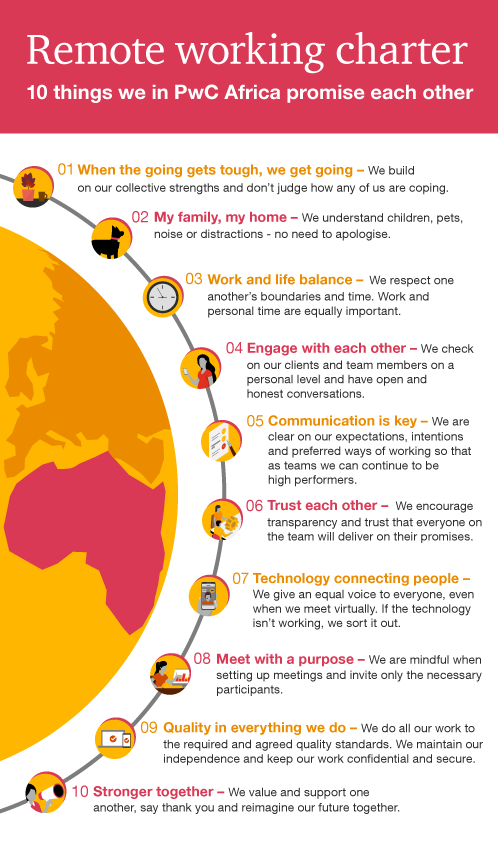
We had virtual talks by psychologists covering topics arising from the COVID-19 uncertainty such as managing panic, responding reasonably to the pandemic, building virtual relationships and supporting working parents. These sessions were attended by 1 122 of our people over the last 6 months. Other professional talks included a series on surviving and thriving in lockdown, financial management during challenges and mental health awareness and support attended by 1,110 of our people. We introduced virtual gym sessions twice a day, five days a week and about 2,000 of our people attended the PwC virtual gym.
In addition to this we’ve also provided support to prospective employees. To help students to cope better with the new normal we hosted a series of webinars with topics ranging from coping with uncertainties, personal branding, the impact of technology on audit and a brief introduction to PwC. These webinars have been popular, attracting more than 1,000 students across the country.
Our employee assistance programme was also extended to provide support to our signed students. Through them, we hosted webinars to assist the students in dealing with uncertainty, adjusting to online learning (mindset), adjusting to new living conditions, identifying mental triggers and red flags, being calm in the face of uncertainty, facing the academic year with confidence, dealing with stress and remaining focused and motivated. More than 300 signed students attended these wellness workshops offered by PwC.






Contact us

Verena Koobair
Head of Communications and Societal Purpose Firm Pillar Lead, PwC South Africa
Tel: +27 (0) 11 797 4873






















